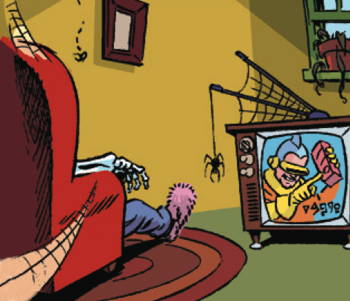July 2016
July 17, 2016
News of the Weird (July 17, 2016)
News of the WeirdWeirdnuz.M484, July 17, 2016
Copyright 2016 by Chuck Shepherd. All rights reserved.
Lead Story
Fashion Challenges: Beautician Sarah Bryan, 28, of Wakefield, England, who garnered worldwide notoriety last year when she introduced a wearable dress made of 3,000 Skittles, returned this summer with a wearable skirt and bra made of donated human hair (a substantial amount, she said, pubic hair). She admits having had to work in eye mask, breathing mask, and thick gloves, out of fear of donors' hygiene habits. (More conventionally, Van Tran of Brooklyn, N.Y., won the 12th annual (wearable) Toilet Paper Wedding Dress design contest in New York City in June, with a $10,000 prize from sponsors Charmin and Ripley's Believe It Or Not.) [Metro News (London), 7-5-2016] [Washington Post, 6-20-2016]
World's Greatest Lawyers
Attorney Chris Dyer convinced a jury in La Crosse, Wis., in June that there was "reasonable doubt" about what his client was doing in a family's basement when he was discovered, pants down, perched ("doggy style") over the family's golden retriever Cooper. Client Daniel Reinsvold (a stranger in the house) told the jury that he has an "intestinal disorder" that makes him subject to "emergencies." What Reinsvold was doing was apparently perfectly clear to the resident's 17-year-old daughter, who discovered the scene and reported Reinsvold "screwing Cooper" (and a vet said later that Cooper showed signs of trauma). Nonetheless, Reinvold was convicted only of trespass and disorderly conduct. [La Crosse Tribune, 6-16-2016]
Attorney Lee Pearlman finally earned an acquittal in June (after two hung-jury trials) for his client Danielle Goeller--one of a seemingly increasing number of drivers who hit pedestrians but claim they were unaware of anybody being hit. Goeller, 28, a trauma-room nurse with no intoxicants in her system, had struck a 60-year-old man on a busy, heavily-lighted Tampa street at 11:45 p.m., cracking her windshield--but drove on without stopping. "What does she think she hit?" asked the prosecutor. "A deer? A bear?" Responded Pearlman, "She's a scared girl in the middle of the night who doesn't have the life experience other people do." [Tampa Bay Times, 7-1-2016]
Bright Ideas
Picturesque Torrelodones, Spain (pop. 22,000), has 6,000 pet dogs and apparently few conscientious dog owners, which town leaders say accounts for the nearly half-ton of "litter" that accumulates daily. The town's latest bright idea: installing a 7-foot-high, 10-foot by 10-foot brown, inflated plastic "swirly" in the center of town as a reminder to residents to pick up after their dogs. (Spain's The Local reported in June that other towns have begun to tackle the problem as well, such as with DNA testing of dogs and street-scrubbing punishment for guilty owners.) [The Local (Barcelona), 6-3-2016]
British student Joshua Browder, 19, created an easy-to-use computer app to help parking-ticketed drivers fight citations that they believe unjust--and now reports that users have won 160,000 cases (out of 250,000), all in London and New York City, by following his question-and-answer "chat" interface at DoNotPay.co.uk. Browder said he was motivated to develop the app (which as of now is still free of charge) after, himself, getting about 30 tickets he says he did not deserve. [Metro News (London), 6-28-2016]
The Passing Parade
(1) A bicycle thief was stopped on June 10th when the bike's owner and several other people chased him from the Walmart parking lot in Eagle Point, Ore., drawing the attention of a passing rider on horseback (Robert Borba), who joined the chase and moments later (according to a report in Portland's The Oregonian) lassoed the man and restrained him until police arrived. (2) A kite surfer on a Sussex beach south of London got into trouble on June 26th and was unable to float back to land--until he was rescued by two Samaritans in kayaks. The saviors happened to be dressed as Batman and Robin for participating in the Shoreham Beach Superhero Paddle. [The Oregonian, 6-10-2016] [Bognor Regis Observer, 6-27-2016]
Wait, What?
Not only are almost all federal employees above average, they are nearly all superior workers, according to a June Government Accountability Office review of agencies' personnel-rating results. (Yes, the review included the departments of Veterans Affairs and Homeland Security.) Most agencies use a 1 ("unacceptable") through 5 ("outstanding") rating system, and GAO found that 99 percent were rated either 5 or 4 ("exceeds 'fully acceptable'"). [Washington Post, 6-13-2016]
Not many DUI stops result in attempts to locate the suspect's chastity-belt key, but the May 14th sobriety-checkpoint stop of Curtis Eidam, 35, in Clinton, Tenn., did. Eidam was outfited in "red mesh see-through hose," according to the police report, with a ribbon tied in his goatee, and also a "little skirt" (perhaps a tutu), when he told officers he needed his key, which happened to be on a necklace of his passenger (a "highly intoxicated" 44-year-old woman). Thus, Eidam was able to unlock and remove the chastity belt, which had been "attached to his penis." (There was also a handgun--illegal in Tennessee for an intoxicated person to carry.) [Knoxville News Sentinel, 6-7-2016]
Cognitive Failure
In a May journal article, biologists from the University of Florida and Oklahoma State University found that more than 80 percent of survey respondents want package labels on all foods that have "DNA" content (even though, yes, all meat and vegetables have DNA). The Oklahoma researcher found earlier that about the same number want such labels to be "mandatory." (Law professor Ilya Somin suggests playfully raising the fright level of those respondents by adding this "alarm" to the label they demand: "Warning: Pregnant women are at very high risk of passing on DNA to their children.") [Reason.com, 5-24-2016] [Washington Post, 5-27-2016] [Federation of American Societies for Experimental Biology, 5-18-2016]
Weird Japan
Client Partners is only one of several Japanese agencies that supply rental "friends" to the lonely, for hours or days of companionship tailored to needs of the socially-challenged client (with two rules, however: "no romance," "no lending money"). A writer for AFAR travel magazine interviewed several "friends" in June, one of whom explained, "Japan is all about face. We don't know how to talk from the gut. We can't ask for help." Said the female "friend" (who offered a good-bye handshake to the interviewer): "There are many people who haven't been touched for years . . . who start to cry when we shake hands with them." [AFAR.com via The Week, 6-26-2016]
But It's Our "Policy"!
Samaritan Derrick Deanda is facing a $143 bill from paramedics in Elk Grove, Calif., after he, passing a car crash, jumped out to pull out a man and his three children (including a 2-year-old), who were trapped in the wreckage. A short time later the paramedics arrived, and noticing that Deanda had a cut on his arm (from breaking the car's window to free the family), bandaged him. Elk Grove has a policy charging "all patients" at a first-responder site $143 for the "rescue," and Deanda received his bill in June. [KOVR-TV (Sacramento), 6-20-2016]
Least Competent Criminals
Not Ready for Prime Time: In May, a 16-year-old boy in Lakewood, Wash., not only used Facebook to set up a marijuana-dealer robbery (one of many, lately, to incriminate themselves on social media), but during the robbery itself accidentally shot himself in the groin and femoral artery, requiring life-saving seven-hour surgery. [News Tribune (Tacoma), 5-2-2016]
A News of the Weird Classic (July 2012)
Slaved Over a Hot Stove: Delivering gourmet meals to customers' doors is a fast-growing business model, but so far, only London's brand-new [as of 2012] Housebites goes the extra step. According to its press release, cited by Huffington Post, Housebites not only home-delivers "restaurant quality" cuisine (at the equivalent of about $20 per entree) but offers an optional dirty-pans service (about $8 extra), lending out the containers in which the food was prepared--thus allowing clients to trick their dinner guests into believing the client actually prepared the meal. [Huffington Post, 6-14-2012]
Thanks This Week to Steven Lobejko, Kathryn Wood, Raan Young, Robin Daley, Larry B. King, Denise Sanabria, and Stephen Kreger, and to the News of the Weird Board of Editorial Advisors.
Posted By: Chuck - Sun Jul 17, 2016 -
Comments (3)
Category:
Adelaide, the hen who laid banana-shaped eggs
Adelaide the Hen (aka Adelaide Benteggs) lived on the farm of Wilfred Waterman in Poole, England. She first came to the attention of the press in 1957, when she began laying banana-shaped eggs. Farmer Waterman put her in solitary confinement, worried that whatever was causing her to lay such eggs "might be catching."Experts from the British Ministry of Agriculture subsequently x-rayed and otherwise examined Adelaide, but couldn't find anything obviously wrong with her that was causing her to lay the banana-shaped eggs.
Adelaide, however, kept laying the odd eggs — hundreds of them — and as a result became a celebrity hen. She appeared on TV and helped raise over £1000 for charity.
When she died, on August 11, 1961, it made international news. It was reported that she died quietly, sitting on her nest, after laying another curved egg. Officials from the British Museum expressed an interest in performing an autopsy on her, but before they could do so Farmer Waterman had her cremated. He kept the ashes in an urn on his sideboard.
Despite her fame, I've been unable to find a single picture anywhere of either Adelaide or one of her curved eggs, which I find puzzling. I would have thought that press photographers would have loved to document such an oddity.

Spokane Daily Chronicle - Mar 1, 1957
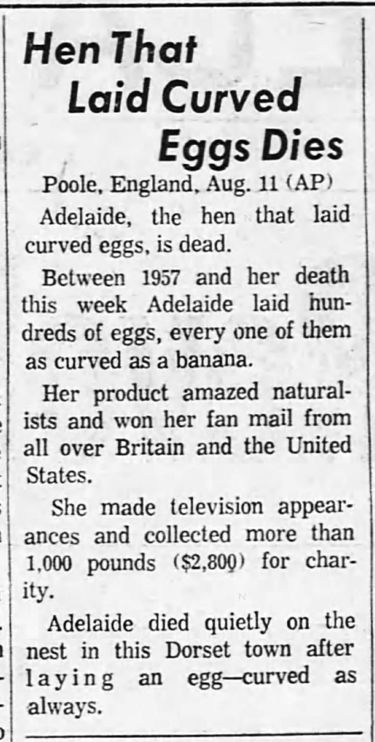
The Decatur Herald - Aug 12, 1961
Posted By: Alex - Sun Jul 17, 2016 -
Comments (0)
Category: Animals, Eggs, 1950s, Bananas
Chiquita Banana Olympics Stickers: 1980

The Brazilian Olympics are in big trouble, as recent news articles tell us. Surely they could use a boost from an athletic banana, like the ad campaign from Chiquita that the 1980 Winter Olympics got. And a tropical fruit is even more synonymous with Brazil than it was with Lake Placid.
Time to bring back Carmen Miranda!
Posted By: Paul - Sun Jul 17, 2016 -
Comments (3)
Category: Disasters, Food, Sports, 1980s, North America, South America, Bananas
July 16, 2016
How to Hide Anything
How To Hide Anything, by Michael Connor (Paladin Press, 1984). The entire book can be viewed or downloaded for free at archive.org.



And also by the same author — Sneak It Through: Smuggling Made Easier.
Posted By: Alex - Sat Jul 16, 2016 -
Comments (4)
Category: Books
Fighting the Traffic in Young Girls
"Sex trafficking 2016," meet "white slavery 1910."Original text here.

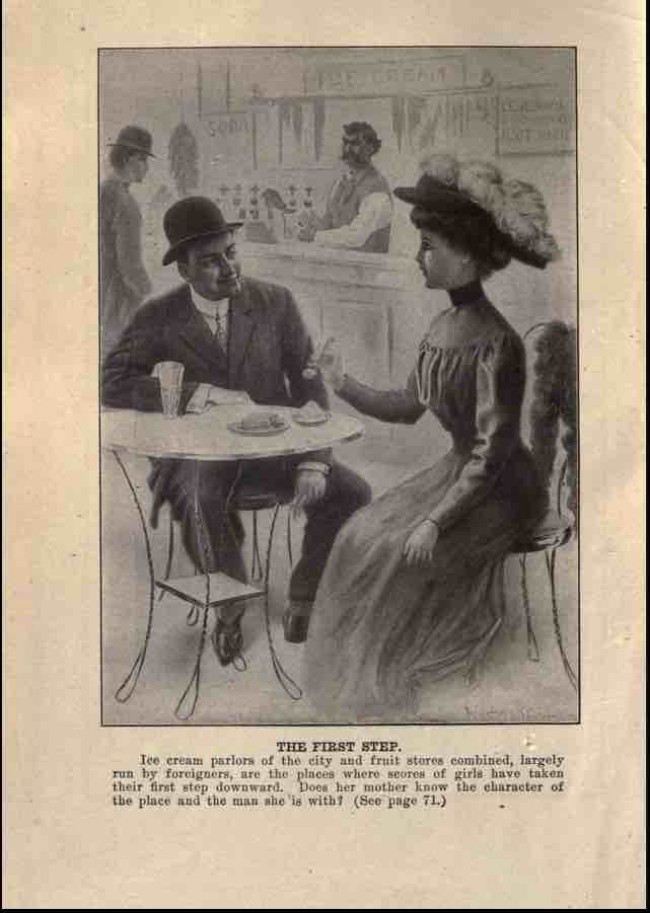
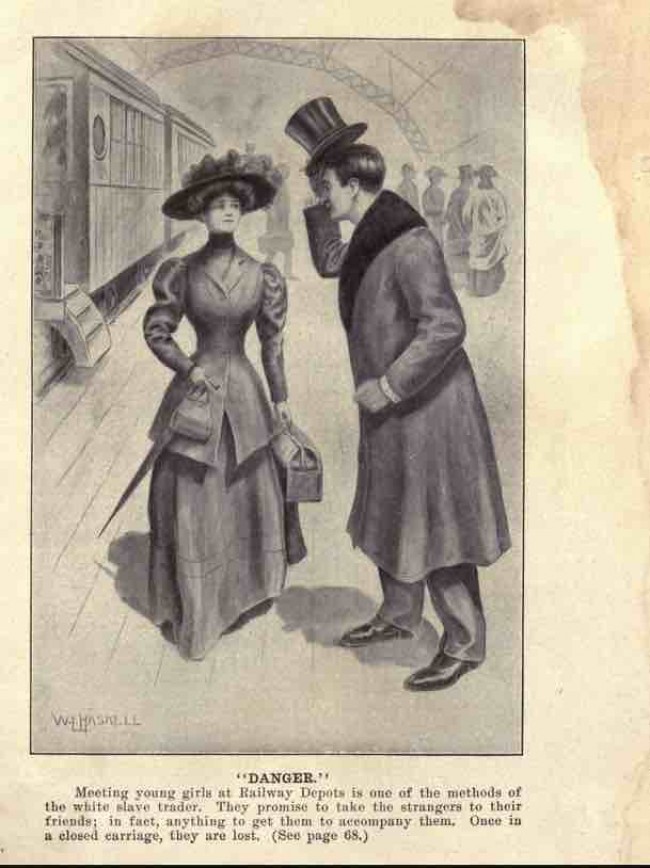
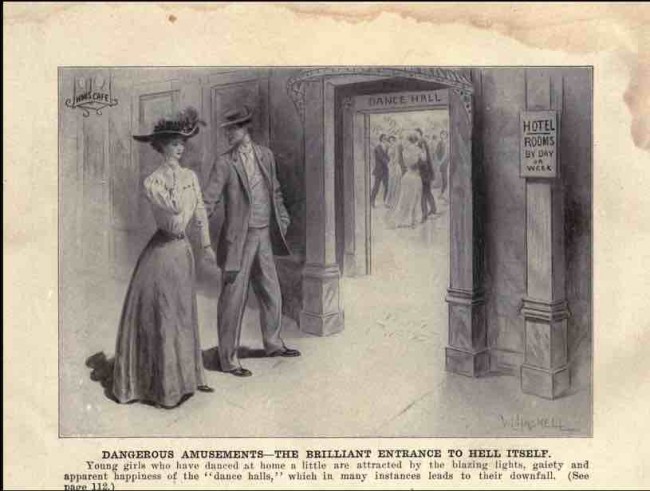
Posted By: Paul - Sat Jul 16, 2016 -
Comments (9)
Category: Crime, Sexuality, Public Indecency, The More Things Change, 1910s
July 15, 2016
Clip-On Armpit Fan
The latest invention from Japan. Sold by Thanko.If you're wearing shorts, you could also use it as a crotch fan.


via RocketNews 24
Posted By: Alex - Fri Jul 15, 2016 -
Comments (8)
Category: Inventions
Rev. irwin Moon, Science Preacher
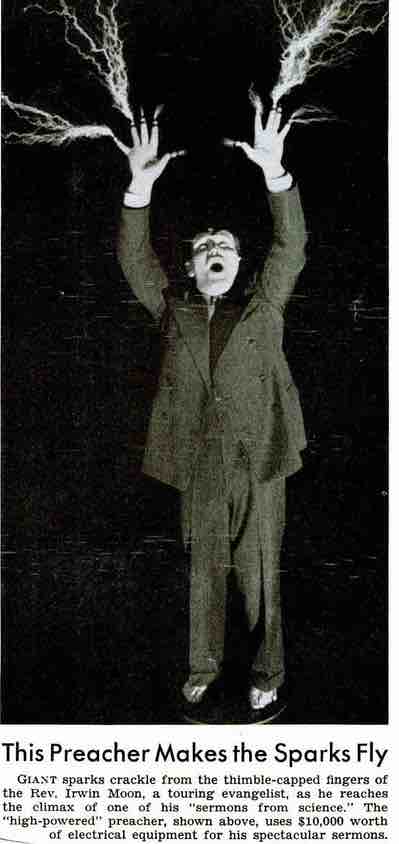
Obituary here.
Posted By: Paul - Fri Jul 15, 2016 -
Comments (0)
Category: Eccentrics, Religion, Science, 1930s
July 14, 2016
Mother-In-Law Beneath Bed
There's in-law problems, and then there's this:
The Morning News (Wilmington, Delaware) - Sep 18, 1956
SINGAPORE, Sept. 17 — A young Chinese wife complained in court today that her mother-in-law always slept under the bed she shared with her husband.
Them Kim Kow said she had left her husband but would go back to him if her mother-in-law could be forced to sleep in a separate room.
An adjournment was asked while the court and attorneys considered the case.
Posted By: Alex - Thu Jul 14, 2016 -
Comments (4)
Category: Divorce, Marriage, 1950s
Mystery Illustration 25

Which male vocalist rocked this splendiferous jacket in 1978?
The answer is here.
Posted By: Paul - Thu Jul 14, 2016 -
Comments (7)
Category: Excess, Overkill, Hyperbole and Too Much Is Not Enough, Fashion, 1970s
July 13, 2016
Corn with odd number of rows

Hood County News-Tablet - Mar 17, 1966
Ears of corn almost always have an even number of rows. Foodreference.com explains the science:
When corn ears are found that have an odd number of rows, that's considered weird enough to make news. For instance, cases of odd-rowed corn surfaced in 1930 (found by Everett Kelderhouse of Collins, Iowa), 1941 (found by Ignac Sedlacek of Malmo, Nebraska), and 1949 (found by Alfred Kohnert of Calamus, Iowa).
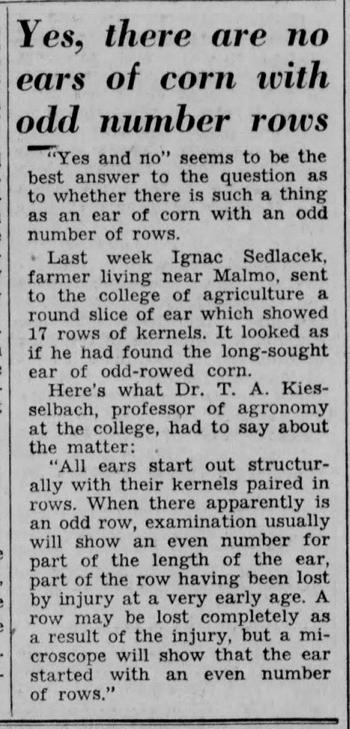
Lincoln Evening Journal - Oct 24, 1941

Carrol Daily Times - Sep 14, 1949
In popular culture, finding odd-rowed corn was sometimes used to make impossible-to-come-true promises. For instance, slaves might be told that they could have their freedom if they could find an ear of corn with an odd number of rows. But in the example below, recounted in Atheism and Arithemetic, Or, Mathematical Law in Nature (1885), one slave supposedly devised a way to find some odd-rowed corn:
Posted By: Alex - Wed Jul 13, 2016 -
Comments (0)
Category: Food, Vegetables
| Get WU Posts by Email | |
|---|---|

| Who We Are |
|---|
| Alex Boese Alex is the creator and curator of the Museum of Hoaxes. He's also the author of various weird, non-fiction books such as Elephants on Acid. Paul Di Filippo Paul has been paid to put weird ideas into fictional form for over thirty years, in his career as a noted science fiction writer. He has recently begun blogging on many curious topics with three fellow writers at The Inferior 4+1. Chuck Shepherd Chuck is the purveyor of News of the Weird, the syndicated column which for decades has set the gold-standard for reporting on oddities and the bizarre. Our banner was drawn by the legendary underground cartoonist Rick Altergott. Contact Us |
